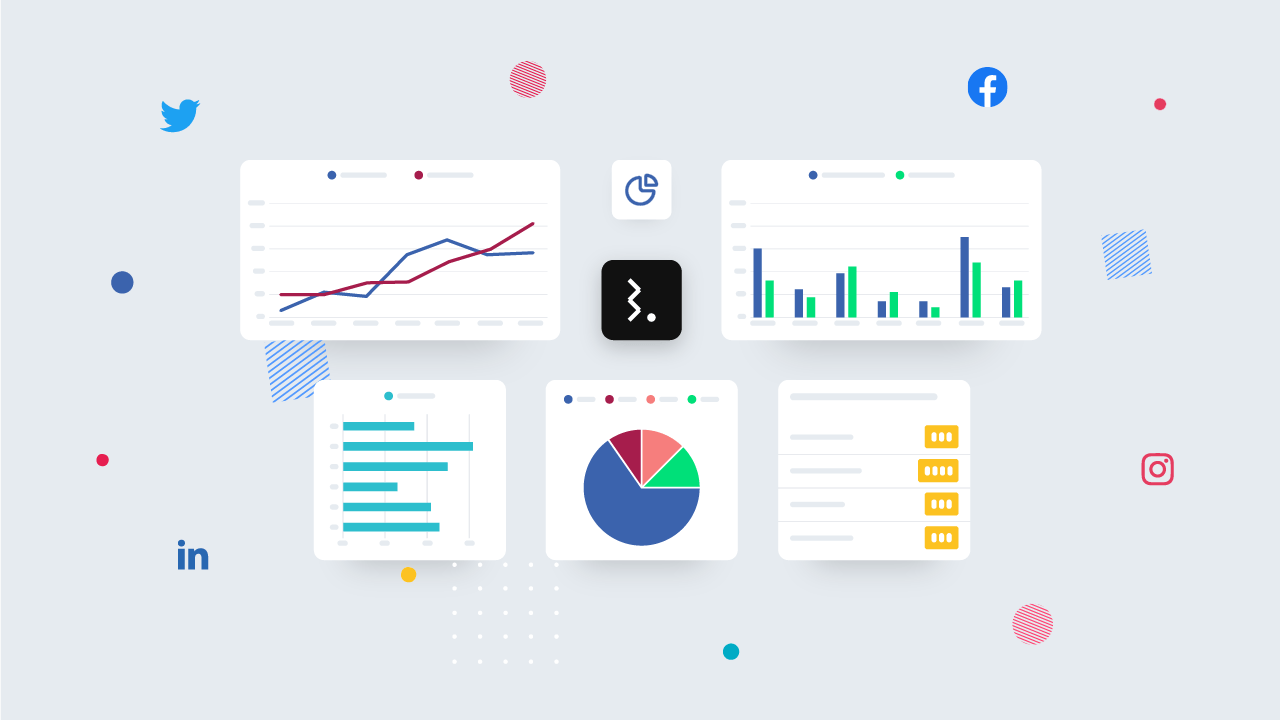In today’s digital era, where businesses thrive on online presence, understanding the impact of social media efforts is paramount. Social Media Reporting Services play a pivotal role in decoding performance metrics, providing valuable insights, and shaping effective marketing strategies.
Why Social Media Reporting Services Matter

1. Tracking Performance Metrics
Social media reporting services empower businesses to track key performance indicators (KPIs) in real time. From engagement rates to click-through rates, having a pulse on these metrics enables agile decision-making and immediate adjustments to marketing strategies.
2. Enhancing Decision-Making
Effective decision-making relies on data-driven insights. Social media reporting services transform raw data into actionable information, enabling businesses to make informed decisions that align with their goals and resonate with their audience.
3. Competitor Analysis
Understanding how competitors fare on social media platforms is crucial for staying ahead in the digital landscape. Social media reporting services offer comprehensive competitor analysis, identifying strengths, weaknesses, and opportunities for improvement.
Key Features of Effective Social Media Reporting Services
1. Real-Time Analytics
The ability to access real-time analytics sets top-notch reporting services apart. Real-time data allows businesses to respond promptly to emerging trends, capitalize on viral content, and address issues before they escalate.
2. Customization Options
Every business is unique, and so are its social media goals. Effective reporting services offer customization options, allowing businesses to tailor reports according to their specific needs and objectives.
3. User-Friendly Interface
Navigating through complex data should not be a daunting task. A user-friendly interface ensures that businesses can easily interpret and extract meaningful insights from the reports, fostering a seamless user experience.
Common Challenges in Social Media Reporting
1. Data Accuracy
One of the challenges faced in social media reporting is ensuring data accuracy. Fluctuations in algorithms and data discrepancies can impact the reliability of the reports. It’s essential to implement measures to enhance data accuracy and reliability.
2. Interpreting Metrics
While social media reporting provides a wealth of data, interpreting these metrics requires a nuanced understanding. Businesses must invest in training or consult with experts to ensure accurate interpretation and actionable insights.
3. Adapting to Algorithm Changes
Social media platforms frequently update their algorithms, impacting how content is distributed and perceived. Effective reporting services should adapt to these changes seamlessly, ensuring continued accuracy and relevance.
Choosing the Right Social Media Reporting Tool
1. Identifying Business Goals
Before selecting a social media reporting tool, businesses must identify their goals. Whether it’s increasing brand awareness, driving website traffic, or boosting engagement, aligning the tool with business objectives is essential.
2. Budget Considerations
While there are various reporting tools available, businesses must consider their budget constraints. Finding a tool that offers a balance between features and affordability is key to a successful implementation.
3. User Reviews and Recommendations
Social proof plays a crucial role in choosing the right reporting tool. Reading user reviews and seeking recommendations from industry peers can provide valuable insights into the tool’s effectiveness and user satisfaction.
Tips for Maximizing the Benefits
1. Regularly Review and Adjust Strategies
Social media landscapes evolve, and so should strategies. Regularly reviewing and adjusting social media strategies based on reporting insights ensures continued relevance and effectiveness.
2. Stay Updated on Social Media Trends
Trends on social media platforms can shift rapidly. Staying updated on the latest trends allows businesses to capitalize on emerging opportunities and adjust their strategies accordingly.
3. Collaborate Across Teams
Effective social media reporting is not solely the responsibility of the marketing team. Collaboration across departments, including sales and customer service, ensures a holistic approach to social media strategy and reporting.
Future Trends
1. Integration with AI and Machine Learning
The future of social media reporting lies in the integration of artificial intelligence (AI) and machine learning. Automated insights, predictive analytics, and personalized recommendations will become standard features, enhancing the efficiency of social media strategies.
2. Predictive Analytics
Moving beyond historical data, predictive analytics will play a crucial role in forecasting social media trends and audience behavior. Businesses can proactively adjust their strategies based on predictive insights, staying ahead of the competition.
3. Cross-Platform Reporting
As businesses expand their presence across multiple social media platforms, the demand for cross-platform reporting will rise. Unified reports that provide insights across various platforms will become essential for comprehensive social media management.
How Social Media Reporting Impacts SEO
1. Content Optimization
Social media reporting services contribute to SEO efforts by highlighting the type of content that resonates with the audience. By optimizing content based on social media insights, businesses can improve their search engine rankings.
2. Keyword Analysis
Analyzing social media interactions provides valuable data for keyword analysis. Businesses can identify trending keywords, understand user language, and incorporate these insights into their SEO strategy for improved visibility.
3. Backlink Monitoring
Effective social media reporting includes monitoring backlinks generated from social platforms. Backlinks are a crucial factor in SEO, and understanding their impact allows businesses to refine their link-building strategies.
Common Misconceptions About Social Media Reporting
1. It’s Only for Large Businesses
Contrary to popular belief, social media reporting is beneficial for businesses of all sizes. Even small businesses can leverage reporting services to optimize their strategies and compete effectively in the digital space.
2. One-Size-Fits-All Solutions
Not all businesses have the same social media goals or target audiences. Choosing a reporting tool that offers customization ensures that businesses receive insights tailored to their specific needs rather than a one-size-fits-all solution.
3. Reporting Equals Success
While reporting is essential, success in social media goes beyond numbers. Building genuine connections, fostering engagement, and creating valuable content are equally crucial for sustained success.
Success Stories: Businesses Thriving with Social Media Reporting
1. Small Business Success
A local coffee shop used social media reporting to understand customer preferences and tailor their content. By consistently implementing insights, they saw a 40% increase in foot traffic within six months.
2. Medium-Sized Company Growth
A mid-sized software company utilized reporting services to identify and capitalize on industry trends. This strategic approach led to a 25% increase in market share and strengthened their position as an industry leader.
3. Enterprise Level Achievements
An enterprise-level e-commerce brand streamlined its global social media strategy through reporting services. The result was a 15% increase in online sales and a 20% expansion of their international customer base.
The Evolution of Social Media Reporting Services
1. From Basic Metrics to Comprehensive Insights
Social media reporting services have evolved from providing basic metrics to offering comprehensive insights. Today, businesses can access a wealth of information, from audience demographics to the performance of individual posts.
2. User Feedback and Iterative Improvements
User feedback has played a pivotal role in refining reporting services. Regular updates and iterative improvements based on user experiences ensure that reporting tools remain user-friendly and effective.
3. Industry Adaptation Over Time
As the digital landscape evolves, social media reporting services adapt to industry changes. Staying at the forefront of technological advancements, reporting tools continue to provide cutting-edge features to meet the dynamic needs of businesses.
Expert Insights: Interviews with Industry Leaders
1. Social Media Managers
Industry-leading social media managers emphasize the importance of data-driven decision-making. They highlight how reporting services enable them to fine-tune strategies, engage the audience effectively, and stay ahead of trends.
2. Data Analysts
Data analysts stress the significance of accurate data interpretation. They discuss how businesses can invest in training or collaborate with experts to extract meaningful insights from social media reports.
3. Marketing Strategists
Marketing strategists share their experiences in leveraging social media reporting for campaign optimization. They discuss the role of reporting services in achieving marketing goals and the importance of adapting strategies based on data insights.
Addressing Security Concerns in Social Media Reporting
1. Data Encryption
To address security concerns, leading reporting tools implement robust data encryption measures. This ensures the protection of sensitive information and maintains the confidentiality of business data.
2. Compliance with Privacy Regulations
Adhering to privacy regulations is a priority for social media reporting services. Ensuring compliance with global privacy standards safeguards businesses from legal complications and builds trust with users.
3. Vendor Security Measures
Choosing reputable reporting vendors is crucial for security. Vendors with stringent security measures protect businesses from potential data breaches and unauthorized access.
Conclusion
In conclusion, social media reporting services have become indispensable for businesses seeking to thrive in the digital landscape. From tracking performance metrics to predicting future trends, the power of analytics reshapes how businesses approach their social media strategies.
Experience the Power of Social Media Reporting: Request a Demo from AIM Technologies today!



